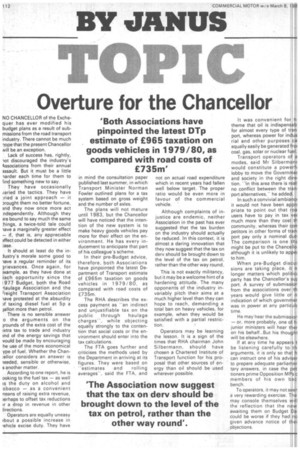Overture for the Chancellor
Page 114

If you've noticed an error in this article please click here to report it so we can fix it.
'Both Associations have pinpointed the latest DTp estimate of £965 taxation on goods vehicles in 1979/80, as compared with road costs of £735m`
NO CHANCELLOR of the Exchequer has ever modified his budget plans as a result of submissions from the road transport industry. There cannot be much lope that the present Chancellor rvill be an exception.
Lack of success has, rightly, lot discouraged the industry's 4ssociations from their annual assault. But it must be a little larder each time for them to find something new to say.
They have occasionally mried the tactics. They have :ried a joint approach — it Nought them no better fortune, and they now once more act ndependently. Although they are bound to say much the same :hings, a twice-told tale could lave a marginally greater effect — if, that is, any appreciable affect could be detected in either ;ase.
It should at least do the inJustry's morale some good to lave a regular reminder of its yievances. Once again, for axample, as they have done at aach opportunity since the 977 Budget, both the Road -laulage Association and the :reight Transport Association lave protested at the absurdity A taxing diesel fuel at 5p a )allon more than petrol.
• There is no sensible answer o the arguments on the ;rounds of the extra cost of the )xtra tax to trade and industry md of the energy savings that voulcl be made by encouraging he use of the more economical ype of fuel. Whether the Chan;ellor considers an answer is teeded, sensible or otherwise, s another matter.
According to one report, he is 'poking to the fuel tax — as well is the duty on alcohol and obacco — as a convenient neans of raising extra revenue, )erhaps to offset tax reductions )r a drop in revenue in other lirections.
Operators are equally uneasy 'bout a possible increase in ,ehicle excise duty. They have
in mind the consultation paper published last summer, in which Transport Minister Norman Fowler outlined plans for a tax system based on gross weight and the number of axles.
The plans will not mature until 1983, but the Chancellor will have noticed that the intention of the new system is to make heavy goods vehicles pay more for their effect on the environment. He has every inducement to anticipate that part of his colleague's scheme.
In their pre-Budget advice, therefore, both Associations have pinpointed the latest Department of Transport estimate of £965m taxation on goods vehicles in 1979/80, as compared with road costs of £735m.
The RHA describes the excess payment as -an indirect and unjustifiable tax on the public through haulage charges'', while objecting equally strongly to the contention that social costs or the environment should enter into the tax calculations.
The FTA goes further and criticises the methods used by the Department in arriving at its figures. They were based on "estimates and rolling averages", said the FTA, and not on actual road expenditure which in recent years had fallen well below target. The proper ratio would be even more in favour of the commercial vehicle.
Although complaints of injustice are endemic, neither Association in the past has ever suggested that the tax burden on the industry should actually be reduced. In this context, it is almost a daring innovation that they now suggest that the tax on dery should be brought down to the level of the tax on petrol, rather than the other way round.
This is not exactly militancy, but it may be a welcome hint of a hardening attitude. The many opponents of the industry invariably pitch their aims at a much higher level than they can hope to reach, demanding a total ban on heavy vehicles, for example, when they would be satisfied with a partial restriction.
Operators may be learning the lesson. It is a sign of the times that-R HA chairman John Silbermann, should have chosen a Chartered Institute of Transport function for his proposal that other sources of energy than oil should be used wherever possible.
It was convenient for h theme that oil is indispensaky for almost every type of tran• port, whereas power for indus rial and other purposes ca equally easily be generated fan coal, gas, solar or nuclear fuel.
Transport operators of a modes, said Mr Silberrnant would constitute a powerft lobby to move the Governmer and society in the right dire' tiori. ''In this area there is mall no conflict between the tram port alternatives," he added.
In such a convivial ambianct it would not have been appirr priate to point out that roa users have to pay in tax ver much more than they cost th community. whereas their con. petitors in other forms of trart port pay only a nominal dish The comparison is one th.E might be put to the Chancello although it is unlikely to appei to him.
When pre-Budget diseut sions are taking place, it longer matters which politic party has the Chancellor's sui port. A survey of submission from the associations over th years would give little or ii indication of which governmer was in power at any particai time.
He may hear the submission — or, more probably, one of hi junior ministers will hear ther on his behalf., But his thoughi will be elsewhere.
If at any time he appears t be listening carefully to th arguments, it is only so that h can instruct one of his adviser to prepare adequate parliamer tary answers, in case the pet tioners prime Opposition MPs c members of his own bac bench.
To operators, it may not seen a very rewarding exercise. The may console themselves witl the reflection that the new awaiting them on Budget Da' could be worse if they had no given advance notice of thei objections.












































































































































































